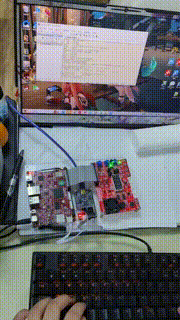华清远见嵌入式学习——ARM——作业3
2023-12-25 19:33:19
作业要求:

代码效果图:

代码:
led.h
#ifndef __LED_H__
#define __LED_H__
#define RCC_GPIO (*(unsigned int *)0x50000a28)
#define GPIOE_MODER (*(unsigned int *)0x50006000)
#define GPIOF_MODER (*(unsigned int *)0x50007000)
#define GPIOE_OTYPER (*(unsigned int *)0x50006004)
#define GPIOF_OTYPER (*(unsigned int *)0x50007004)
#define GPIOE_OSPEEDR (*(unsigned int *)0x50006008)
#define GPIOF_OSPEEDR (*(unsigned int *)0x50007008)
#define GPIOE_PUPDR (*(unsigned int *)0x5000600C)
#define GPIOF_PUPDR (*(unsigned int *)0x5000700c)
#define GPIOE_ODR (*(unsigned int *)0x50006014)
#define GPIOF_ODR (*(unsigned int *)0x50007014)
void all_led_init();
void led1_on();
void led1_off();
void led2_on();
void led2_off();
void led3_on();
void led3_off();
#endifled.c
#include "led.h"
void all_led_init()
{
RCC_GPIO |= (0X3<<4);//时钟使能
GPIOE_MODER &=(~(0X3<<20));//设置PE10输出
GPIOE_MODER |= (0X1<<20);
//设置PE10为推挽输出
GPIOE_OTYPER &=(~(0x1<<10));
//PE10为低速输出
GPIOE_OSPEEDR &= (~(0x3<<20));
//设置无上拉下拉
GPIOE_PUPDR &= (~(0x3<<20));
//LED2
GPIOF_MODER &=(~(0X3<<20));//设置Pf10输出
GPIOF_MODER |= (0X1<<20);
//设置Pf10为推挽输出
GPIOF_OTYPER &=(~(0x1<<10));
//Pf10为低速输出
GPIOF_OSPEEDR &= (~(0x3<<20));
//设置无上拉下拉
GPIOF_PUPDR &= (~(0x3<<20));
//LED3
GPIOE_MODER &=(~(0X3<<16));//设置PE8输出
GPIOE_MODER |= (0X1<<16);
//设置PE8为推挽输出
GPIOE_OTYPER &=(~(0x1<<8));
//PE8为低速输出
GPIOE_OSPEEDR &= (~(0x3<16));
//设置无上拉下拉
GPIOE_PUPDR &= (~(0x3<<16));
}
void led1_on()
{
GPIOE_ODR |= (0x1<<10);
}
void led1_off()
{
GPIOE_ODR &= (~(0x1<<10));
}
void led2_on()
{
GPIOF_ODR |= (0x1<<10);
}
void led2_off()
{
GPIOF_ODR &= (~(0x1<<10));
}
void led3_on()
{
GPIOE_ODR |= (0x1<<8);
}
void led3_off()
{
GPIOE_ODR &= (~(0x1<<8));
}uart.h
#ifndef __UART4_H__
#define __UART4_H__
#include"stm32mp1xx_rcc.h"
#include"stm32mp1xx_gpio.h"
#include"stm32mp1xx_uart.h"
void uart4_config();
void putchar(char a);
char getchar();
void gets(char *s);
void puts(char *s);
int strcmp(char *s1,char *s2);
#endifuart.c
#include"uart4.h"
//uart4的相关配置
void uart4_config()
{
//1.使能GPIOB\GPIOG\UART4外设时钟
RCC->MP_AHB4ENSETR |= (0x1<<1);//gpiob
RCC->MP_AHB4ENSETR |= (0x1<<6);//gpiog
RCC->MP_APB1ENSETR |= (0x1<<16);//uart4
//2.设置PB2\PG11用于UART4的管脚复用
//设置PG11
GPIOG->MODER &= (~(0x3<<22));
GPIOG->MODER |= (0x2<<22);
GPIOG->AFRH &= (~(0xf<<12));
GPIOG->AFRH |= (0x6<<12);
//设置PB2
GPIOB->MODER &= (~(0x3<<4));
GPIOB->MODER |= (0x2<<4);
GPIOB->AFRL &= (~(0xF<<8));
GPIOB->AFRL |= (0x8<<8);
//禁用串口
USART4->CR1 &= (~0x1);
//3.设置数据位宽为8位
USART4->CR1 &= (~(0x1<<12));
USART4->CR1 &= (~(0x1<<28));
//4.设置无奇偶校验位
USART4->CR1 &= (~(0x1<<10));
//5.设置16倍过采样
USART4->CR1 &= (~(0x1<<15));
//6.设置1位停止位
USART4->CR2 &= (~(0x3<<12));
//7.设置不分频
USART4->PRESC &= (~0xf);
//8.设置波特率为115200
USART4->BRR=0X22B;
//9.使能发送器
USART4->CR1 |= (0x1<<3);
//10.使能接收器
USART4->CR1 |= (0x1<<2);
//11.使能串口
USART4->CR1 |= (0x1);
}
void putchar(char a)
{
//1.先判断发送器是否为空,不为空等待
while(!(USART4->ISR &(0x1<<7)));
//2.向发送寄存器写入数据
USART4->TDR=a;
//3.等待发送完成
while(!(USART4->ISR &(0x1<<6)));
}
char getchar()
{
char a;
//1.判断接收器是否有准备好的数据,没有就等待
while(!(USART4->ISR &(0x1<<5)));
//2.读取数据
a=USART4->RDR;
//3.返回
return a;
}
//发送一个字符串
void puts(char *s)
{
while(*s)
{
putchar(*s);
s++;
}
putchar('\r');
putchar('\n');
}
//接收一个字符串
void gets(char *s)
{
while(1)
{
*s=getchar();
putchar(*s);//键盘输入的内容在串口上回显
if(*s=='\r')
break;
s++;
}
*s='\0';
}
//实现字符串比较
int strcmp(char *s1,char *s2)
{
int i = 0;
while(((*(s1+i))==(*(s2+i))))
{
i++;
if( (*(s1+i)=='\0'))
{
break;
}
}
int sub = ((*(s1+i))-(*(s2+i)));
if(sub>0)
{
return sub;
}
else if(sub<0)
{
return sub;
}
else
{
return 0;
}
}main.c
#include "uart4.h"
#include "led.h"
int main()
{
char buf[128];
char *ledon1 = "led1on";
char *ledon2 = "led2on";
char *ledon3 = "led3on";
char *ledoff1 = "led1off";
char *ledoff2 = "led2off";
char *ledoff3 = "led3off";
uart4_config();
all_led_init();
while (1)
{
gets(buf); // 读取字符串
puts(buf); // 打印字符串
//判断字符串,确定灯的亮与灭
if((strcmp(buf,ledon1) == 0)) //一号灯亮
{
led1_on();
}
else if((strcmp(buf,ledoff1) == 0)) //一号灯灭
{
led1_off();
}
else if((strcmp(buf,ledon2) == 0)) //二号灯亮
{
led2_on();
}
else if((strcmp(buf,ledoff2) == 0)) //二号灯灭
{
led2_off();
}
else if((strcmp(buf,ledon3) == 0)) //三号灯亮
{
led3_on();
}
else if((strcmp(buf,ledoff3) == 0)) //三号灯灭
{
led3_off();
}
}
}
文章来源:https://blog.csdn.net/qq_54502935/article/details/135206241
本文来自互联网用户投稿,该文观点仅代表作者本人,不代表本站立场。本站仅提供信息存储空间服务,不拥有所有权,不承担相关法律责任。 如若内容造成侵权/违法违规/事实不符,请联系我的编程经验分享网邮箱:veading@qq.com进行投诉反馈,一经查实,立即删除!
本文来自互联网用户投稿,该文观点仅代表作者本人,不代表本站立场。本站仅提供信息存储空间服务,不拥有所有权,不承担相关法律责任。 如若内容造成侵权/违法违规/事实不符,请联系我的编程经验分享网邮箱:veading@qq.com进行投诉反馈,一经查实,立即删除!